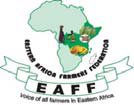Arusha — Small scale farmers from twelve African countries have decided to fight back amid ongoing threats of them being swallowed by large estates.
The Farmers hailing from DR. Congo, Somali, Eritrea, Djibouti, Sudan, Burundi, Rwanda, Uganda, Kenya, the Comoros and Tanzania, who met for three days at the Impala Hotel last week, have resolved to address the issue of large scale estates swallowing small scale farms at the expense of food security in the continent.
The farmers also addressed the issue of ongoing land grabbing affecting peasants all over the continent as large foreign investors flock into Africa to open estates and businesses.
Through the Eastern African Farmers Federation the hundreds of small scale farmers converged in Arusha for their 'Farmers Congress' whose guiding agenda was 'A strengthening Farmers Federation Towards a Sustainable Food Security and Regional Integration!'
"In the last two decades we witnessed failing support of the agriculture sector by our governments and even through development assistance this lead to increasing food insecurity and poverty on the continent," stated Mr. Philip Kiriro the president of the Farmers Federation.
According to Mr. Kiriro, agriculture is the most important and the largest economic sector in eastern Africa contributing enormously to the GDP of National governments that is between 26 and 47 percent and providing over 70 percent of industrial raw materials.
"Agriculture in the region has unique characteristic in that it is predominantly small scale, involving 70 to 93 percent of our rural population meaning that the most important economic sector of the region is dominated by small producers who in case of Africa are very much at disadvantage," he pointed out.
The farmers during their discussions warned of increasing cases of these small producers being elbowed out of their lands by rich conglomerates especially estates dealing with cash crops at the expense of food crops.
As the result, food production keeps falling and due to that, food prices are escalating signaling dire food insecurity in the continent.
"In the year 2008 food prices inflation in the region was above 90 percent and this year (2009) food prices are recorded to be 100 percent higher than in 2004," he stated.













